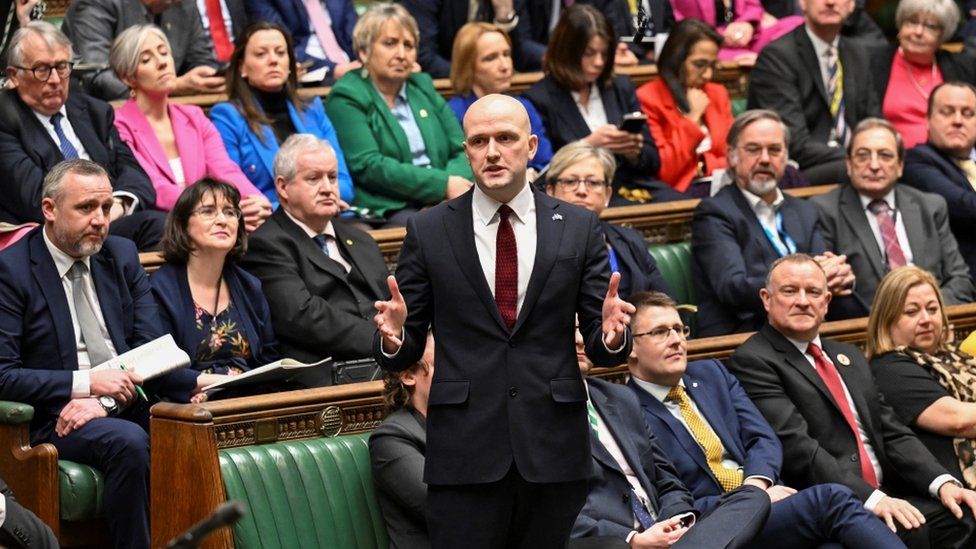SNP considers 'disengagement' protest in Commons over Gaza debate
- Published

The SNP in Westminster is considering a campaign of "disengagement" with day-to-day Parliamentary activities, according to party sources.
They said MPs could cause disruption or pull back from some activities.
It follows a breakdown in relations between the party and the House of Commons speaker over an SNP debate about Gaza.
However, the party's leader at Westminster, Stephen Flynn, denied that the SNP was planning to disengage.
Last week, the speaker, Sir Lindsay Hoyle, allowed a Labour amendment to be voted on during an SNP debate on calls for a ceasefire in Gaza. It meant the SNP's own motion was not voted on.
His decision was met with calls for him to resign as speaker from some SNP and Conservative MPs, with Sir Lindsay apologising to the SNP at the time for his handling of the issue.
He also indicated that he would allow a fresh debate under emergency rules - before announcing on Monday that he would not be doing so.
Sir Lindsay said he understood the UK government was "ready to make a relevant statement" on Tuesday so there would be an imminent opportunity for MPs to discuss the issue without holding an emergency debate.
The statement was made by Foreign Office Minister Andrew Mitchell, who said calling for a ceasefire would not be enough to make one happen and re-stated the government's position.
"We are trying to negotiate an immediate pause in order that we can get the hostages out and get incredibly badly-needed aid in, leading to a sustainable ceasefire," he said.
Anger has not died down within the SNP, with the party's Westminster leader Stephen Flynn accusing the speaker of having "effectively lied".
An Early Day Motion of no confidence in the speaker had been signed by 86 SNP, Conservative and Plaid Cymru MPs by Tuesday night.
What does disengagement look like?
"Disengaging" with the House of Commons could include not turning up to committees on which the SNP has a seat or refusing to turn up to debates held outside of the main Commons chamber - for example in Westminster Hall.
It is understood that more "dramatic" options to disrupt proceedings are also being considered.
The strategy has yet to be finalised but the party is seeking to keep up the pressure on the Speaker and Parliament.
It wants to send a message in Scotland during an election year about what the party sees as the "bigger issue": the SNP allegedly being failed by Westminster and treated as "an irrelevance", according to those close to the leadership.
One SNP source told the BBC the party was considering a strategy of "disengagement" with some day-to-day parliamentary activities.
Another SNP source said: "We are acutely aware we could cause a lot of problems down here that could disrupt the process [of the House].
"We don't want to cause trouble for the sake of it - there's a purpose to everything we're trying to do."
SNP will not 'leave Scotland voiceless'
However, the party's leader at Westminster, Stephen Flynn, denied that the SNP was planning to disengage.
He posted on social media to say the importance of the SNP's role in Westminster had been exemplified over the controversy.
Mr Flynn said: "No, they aren't [considering disengagement].
"The importance of our role has been exemplified these last few weeks, driving debate over Gaza and changing Labour Party policy.
"Until we achieve our independence, we will never leave Scotland voiceless in Westminster."
The SNP and some Conservative MPs are expected to further vocalise their unhappiness with the speaker at Prime Minister's Questions on Wednesday.
The SNP is also pushing for a "full, independent investigation" into claims that Sir Keir Starmer deliberately put pressure on the speaker to give Labour a vote on its ceasefire amendment during the SNP's Opposition Day debate - claims the Labour leader denies.
A Scottish Labour spokesperson said: "The SNP have disengaged with Westminster for years, delivering nothing for communities across Scotland.
"At the general election, Scotland has a chance not just to send a message but to send a government who will work to deliver the change that Scotland needs."